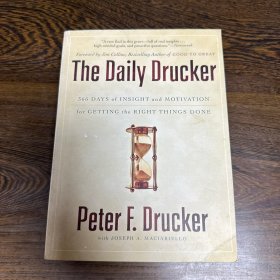
The Daily Drucker德鲁克日志 英文原版
¥ 60 4.9折 ¥ 121.5 八五品
仅1件
作者Peter Drucker(彼得·德鲁克) 著
出版社HarperCollins US
出版时间2004-01
版次1
印刷时间2004-01
印次1
装帧平装
上书时间2024-07-23
- 在售商品 暂无
- 平均发货时间 10小时
- 好评率 暂无
- 最新上架
商品详情
- 品相描述:八五品
图书标准信息
- 作者 Peter Drucker(彼得·德鲁克) 著
- 出版社 HarperCollins US
- 出版时间 2004-01
- 版次 1
- ISBN 9780062089243
- 定价 121.50元
- 装帧 平装
- 开本 16开
- 纸张 胶版纸
- 页数 448页
- 正文语种 英语
- 【内容简介】
-
A powerful new learning tool for the ambitious, self-directed manager, entrepreneur, or business person today, The Daily Drucker distils the essence of management guru Peter F. Drucker's teachings in an easy-to-access, daily calendar format. It presents in organized form: a key statement of Drucker's, followed by a few lines of comment and explanation, with topics ranging across a great many fields of his work: management, business and the world economy; a changing society; innovation and entrepreneurship; decision-making; the changing workforce and the non-profit and their management. However, the most important part of this book are the blank halves of its pages. They are what the readers will contribute, their actions, decisions and the results of these decisions.
There are 366 readings, each addressing a major topic, one for every day of the year. Each reading starts with a topic and a "Drucker Proverb" such as "Know Thy Time", capturing the essence of the topic. Then there is a teaching taken directly from the works of Peter Drucker. Next comes the action step, where you are asked to "Think on" the teaching and apply it to yourself and your organization.
* Peter. F. Drucker's teachings, encapsulated in an easy to access, daily calendar format.
* Examines the four fundamental areas of Drucker's theories: the Individual, Management, Society and Change.
* The quintessential Drucker, a new generation of managers will be introduced to his entire body of work in a user-friendly style. - 【作者简介】
-
Peter Ferdinand Drucker (November 19, 1909 – November 11, 2005) was an influential writer, management consultant, and self-described “social ecologist.”
Drucker was both on his paternal and his maternal side of Jewish descent, but his parents converted to Christianity and lived in what he referred to as a "liberal" Lutheran Protestant household in Austria-Hungary. His mother Caroline Bondi had studied medicine and his father Adolf Drucker was a lawyer and high-level civil servant. Drucker was born in Vienna, the capital of Austria, in a small village named Kaasgraben (now part of the 19th district of Vienna, Döbling). He grew up in a home where intellectuals, high government officials, and scientists would meet to discuss new ideas.
After graduating from Döbling Gymnasium, Drucker found few opportunities for employment in post-World War Vienna, so he moved to Hamburg, Germany, first working as an apprentice at an established cotton trading company, then as a journalist, writing for Der Österreichische Volkswirt (The Austrian Economist). Drucker then moved to Frankfurt, where he took a job at the Daily Frankfurter General-Anzeiger. While in Frankfurt, he also earned a doctorate in international law and public law from the University of Frankfurt in 1931.
In 1933, Drucker left Germany for England. In London, he worked for an insurance company, then as the chief economist at a private bank. He also reconnected with Doris Schmitz, an acquaintance from the University of Frankfurt whom he married in 1934. The couple permanently relocated to the United States, where he became a university professor as well as a free-lance writer and business consultant.
In 1943, Drucker became a naturalized citizen of the United States. He then had a distinguished career as a teacher, first as a professor of politics and philosophy at Bennington College from 1942–1949, then for more than twenty years at New York University as a Professor of Management from 1950 to 1971.
Drucker came to California in 1971, where he developed one of the country's first executive MBA programs for working professionals at Claremont Graduate University (then known as Claremont Graduate School). From 1971 to his death he was the Clarke Professor of Social Science and Management at Claremont Graduate University. Claremont Graduate University's management school was named the "Peter F. Drucker Graduate School of Management" in his honor in 1987 (later renamed the "Peter F. Drucker and Masatoshi Ito Graduate School of Management"). He taught his last class there in 2002 at age 92. Drucker also continued to act as a consultant to businesses and non-profit organizations well into his nineties.
He died November 11, 2005 in Claremont, California of natural causes at 95.
彼得·德鲁克(Peter Drucker,1909.11.19-2005.11.11),现代管理学之父。彼得·德鲁克于1909年生于维也纳,祖籍为荷兰,后移居美国。德鲁克家族的先人在17世纪时从事书籍出版工作。德鲁克的父亲为奥国负责文化事务的官员。母亲是率先学习医学的妇女之一。德鲁克从小生长在富裕文化的环境之中,其1979年所著的自传体小说《旁观者》对其成长历程作了详细而生动的描述。彼得·德鲁克在管理界是受人尊敬的思想大师。
相关推荐
-

The Daily Drucker
全新保定
¥ 56.50
-

the daily drucker(精装本)
八五品深圳
¥ 30.00
-

The Daily Drucker德鲁克日志 英文原版
九品北京
¥ 30.00
-

The Daily Drucker德鲁克日志 英文原版
八五品上海
¥ 66.04
-

The Daily Drucker德鲁克日志 英文原版
九品杭州
¥ 89.00
-

The Daily Drucker德鲁克日志 英文原版
八五品长沙
¥ 76.50
-

The Daily Drucker德鲁克日志 英文原版
八五品北京
¥ 45.00
-

The Daily Drucker德鲁克日志 英文原版
九品商丘
¥ 43.00
-

The Daily Drucker德鲁克日志 英文原版
八五品嘉兴
¥ 68.00
-

The Daily Drucker德鲁克日志 英文原版
九品呼和浩特
¥ 150.00
— 没有更多了 —














以下为对购买帮助不大的评价